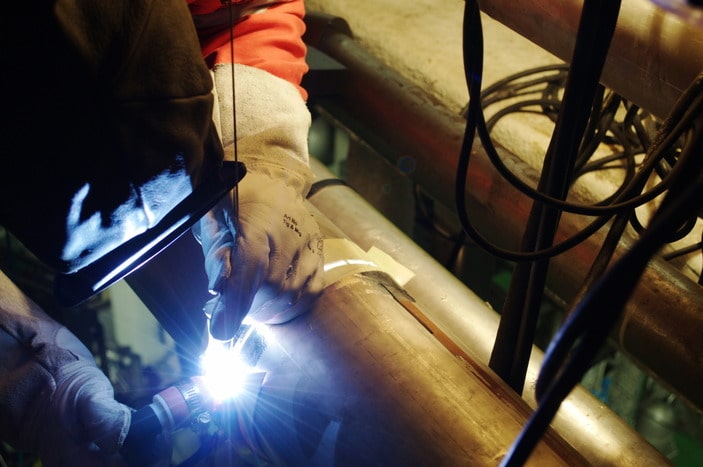
- July 12, 2023
- |security guard company
- | 0
Fire Safety in High-Risk Environments –
As a reputable fire watch guard company, XPressGuards recognizes the critical importance of fire safety during hot work operations. Hot work, which involves activities such as welding, cutting, grinding, and soldering, presents significant fire hazards due to the potential for sparks, flames, and heat generation. Fire watch guards play a crucial role in preventing fire incidents and maintaining a safe working environment during hot work operations. In this article, we will explore the specific fire watch requirements for hot work operations, including risk assessment, preventive measures, fire watch duties, and emergency response protocols.
Conducting Risk Assessment
Before commencing any hot work operation, a thorough risk assessment must be conducted. Fire watch guards work closely with hot work operators and site managers to identify potential fire hazards, assess the level of risk, and implement appropriate preventive measures. The risk assessment process includes evaluating factors such as the proximity of combustible materials, ventilation conditions, the presence of flammable gases or liquids, and the availability of fire protection equipment.
Implementing Preventive Measures
To mitigate the fire risks associated with hot work operations, fire watch guards assist in implementing a range of preventive measures. These measures may include:
- Establishing designated hot work areas: Fire watch guards help define specific areas where hot work operations can be conducted safely. These areas are typically isolated from other activities, well-ventilated, and equipped with fire-resistant barriers or screens to contain sparks.
- Ensuring proper ventilation: Adequate ventilation is essential to disperse fumes and reduce the concentration of flammable gases or vapors. Fire watch guards verify that ventilation systems are functioning effectively during hot work operations.
- Implementing fire-resistant shielding: Fire watch guards ensure that combustible materials and surfaces in the vicinity of hot work operations are adequately shielded to prevent sparks or slag from causing ignition.
- Monitoring the use of fire extinguishers: Fire watch guards ensure that appropriate types and quantities of fire extinguishers are readily available near the hot work area. They confirm that fire extinguishers are in proper working condition, inspected regularly, and easily accessible to operators.
- Removing or securing flammable materials: Fire watch guards oversee the removal or proper storage of flammable materials near the hot work area to minimize the risk of accidental ignition.
- Ensuring proper training and certification: Fire watch guards ensure that hot work operators have the necessary training and certification to perform their tasks safely. This includes knowledge of fire safety procedures, proper use of personal protective equipment (PPE), and understanding of emergency response protocols.
Fire Watch Duties and Responsibilities
During hot work operations, fire watch guards assume specific duties and responsibilities to prevent and respond to fire incidents. These duties include:
- Continuous monitoring: Fire watch guards maintain constant surveillance of the hot work area, watching for sparks, flames, or smoldering materials that could lead to a fire.
- Prompt fire detection and reporting: Fire watch guards are trained to identify fire incidents at their earliest stages. If a fire is detected, they immediately activate the alarm, notify all personnel in the area, and contact emergency services.
- Fire extinguisher readiness: Fire watch guards ensure that fire extinguishers suitable for the specific hot work operations are readily available and in proper working condition. They are trained to use fire extinguishers effectively, prioritizing safety and understanding when to evacuate and summon professional firefighters.
- Assisting with emergency evacuation: In the event of a fire, fire watch guards assist in implementing emergency evacuation procedures, guiding workers to safe assembly points, and ensuring an orderly evacuation.
- Post-operation monitoring: Fire watch guards remain vigilant for any smoldering materials or residual fire hazards after the completion of hot work operations. They continue to monitor the area until it is deemed safe and ensure that proper clean-up procedures are followed.
Emergency Response Protocols
Fire watch guards are well-versed in emergency response protocols specifically designed for hot work operations. These protocols may include:
- Clear communication: Fire watch guards maintain open communication channels with hot work operators, site managers, and emergency responders to ensure swift and coordinated response in case of a fire incident.
- Emergency shutdown procedures: Fire watch guards are trained in emergency shutdown procedures specific to the hot work equipment being used. They know how to isolate fuel sources, deactivate electrical systems, and implement other necessary shutdown measures.
- Emergency evacuation plans: Fire watch guards collaborate with site managers to develop emergency evacuation plans tailored to hot work operations. These plans outline evacuation routes, assembly areas, and communication methods to ensure a safe and organized evacuation process.
- Coordination with emergency responders: Fire watch guards work in collaboration with local fire departments and other emergency responders, providing critical information about the nature of the hot work operation, location, and potential hazards. They follow the instructions provided by emergency responders to support firefighting efforts.
Training and Preparedness
Fire watch guards undergo comprehensive training and preparedness exercises to enhance their fire safety knowledge and skills related to hot work operations. Training includes fire risk assessment, preventive measures, fire watch duties, fire extinguisher usage, evacuation procedures, and emergency response protocols specific to hot work operations. Regular drills and simulations are conducted to test the effectiveness of fire watch procedures, enhance response capabilities, and identify areas for improvement.
Fire watch requirements for hot work operations are essential for maintaining fire safety in high-risk environments. By conducting risk assessments, implementing preventive measures, performing fire watch duties, and following emergency response protocols, fire watch guards play a crucial role in preventing fire incidents and ensuring the safety of personnel and property during hot work operations. XPressGuards is committed to providing highly trained fire watch guards who excel in implementing effective fire watch procedures for hot work operations, mitigating fire risks, and safeguarding the work environment. Contact us to learn more information.


